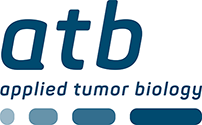ATB research is nominated for Felix Burda Award 2024 in the category “Medicine and Science”
Three research projects nominated for Felix Burda Award 2024, ATB research among them
On April 21, 2024, the Felix Burda Award will be presented for the 19th time. The Felix Burda Foundation honors outstanding commitment and groundbreaking research in the field of colorectal cancer prevention. After a four-year break, the gala will once again take place at the Hotel Adlon Kempinski Berlin. Six projects from Germany and Austria are nominated, three in the category “Engagement of the Year” and three in the category “Medicine and Science”. ATB’s research on the “Immune System as Key to Colorectal Cancer Prevention in High-Risk Individuals” is nominated for the prize together with two other fantastic projects dedicated to cancer prevention. ATB is deeply honored by this nomination, wishes all nominated projects good luck and looks forward to the Gala Evening!
Lynch Syndrome Awareness Campaign 2024: #StrengthInStories
© 2024 ATB.
Living with Lynch: a personal story
March is the international Colorectal Cancer Awareness Month and also this year ATB teamed up with the patient organization SemiColon to raise awareness about Lynch syndrome and empower patients. During this entire month we have been sharing a personal story of living with Lynch told by Heinke, a courageous woman with Lynch syndrome. In her story, Heinke highlighted the aspects of the psychological burden and considerations associated with possibly positive genetic test and shared, what encouraged her to take the test. We also addressed the extra-colorectal manifestations of Lynch syndrome, most commonly affecting the uterus and therefore requiring an interdisciplinary approach in the clinical management of Lynch syndrome carriers. The life-saving features of screening were emphasized to underline the importance of cancer prevention. Importantly, immunotherapy, the novel therapeutic approach which usually works particularly well in Lynch syndrome patients and which made Heinke to a “prognosis breaker” was highlighted. We shared Heinke’s story on ATB’s and SemiColon’s Instagram channels under the hashtags “StrengthInStories” and “LivingWithLynch”. Follow us on Instagram to learn more about Heinke’s story.
By sharing her story Heinke aimed to encourage and empower other carriers and their family members. We are extremely grateful to Heinke for her courage and great contribution to Lynch Syndrome Awareness.
This campaign was a collaborative project of the German Lynch Syndrome Patient Organization SemiColon and ATB Heidelberg supported by the German Consortium for Familial Intestinal Cancer, Network against Colorectal cancer, ERN Genturis and European Hereditary Tumor Group.
RNZ highlights ATB research on cancer-preventive vaccines
Molecular cancer prevention: next steps in vaccine development
Genetic cancer predisposition is the most important measurable risk factor for cancer particularly at young age. Thus, developing specialized prevention approaches for the population of individuals at enhanced risk for cancer could help to reduce the burden of preventable cancer. We at ATB work on targeted, molecular approaches for cancer prevention. One of the major focuses of our research is development of a vaccine to prevent cancers arising in the context of Lynch syndrome. We are grateful to RNZ for highlighting our research among other exciting research at DKFZ dedicated to innovative cancer prevention approaches. This is also an important step in raising awareness about the most common inherited cancer syndrome, Lynch syndrome.
INDICATE Project receives a grant from the Wilhelm Sander Foundation
Lena Bohaumilitzky receives the Thomas Weber Research Scholar Award at this year’s CGA-IGC Conference
Highlight from CGA-IGC: our junior PostDoc receives the Research Scholar Award
The 2023 Conference of the Collaborative Group of Americas on Inherited Gastrointestinal Cancers was full of highlights for us. It was very exciting to receive stage for our research and present our most recent scientific projects. But it was most exciting to witness our junior PostDoc, Lena Bohaumilitzky, going to the stage to receive this years Thomas Weber Research Scholar Award. We are very proud of Lena and extremely grateful to the Award Committee for encouraging early career researchers by supporting their conference participation. Congratulations, Lena!
Guest Lecture by Prof. Shizuko Sei from NCI, NIH

Join Prof. Sei’s talk at DKFZ!
We are happy to announce that our long-year collaboration partner from NCI, NIH (USA), Prof. Shizuko Sei, is visiting Heidelberg. She will give a talk on on the topic of translational cancer prevention programs at the NCI.
Don’t miss the opportunity to dive into NCI cancer prevention programs and join us for Prof. Sei’s upcoming talk!
Swarm Learning AI for Colorectal Cancer
© UKB/Rolf Müller
DECADE Kickoff Meeting
We are excited to announce the Kickoff of the DECADE Project funden by the German Cancer Aid for 3 years with 1.5 million €.
In this collaborative study, research centers from Dresden (Project Lead: Prof. Jakob Nikolas Kather), Heidelberg (Prof. Matthias Kloor and Dr. Aysel Ahadova), Bonn (Prof. Jacob Natermann and Dr. Robert Hüneburg), Mainz (Prof. Beaute Straub) and Düsseldorf (Prof. Tom Lüdde) will join forces to improve our understanding of colorectal cancer. Together we will harness the collective intelligence of AI models with an ultimate goal of providing more accurate diagnoses, better prognostic insights and response prediction for patients. Also here, the major focus of ATB will be Lynch syndrome, which is why it is so important for us to have Lynch syndrome Patient Organisation SemiColon and our wonderful patient representatives, Nicola Reents and Simone Widhalm on board from the very beginning.
We thank the German Cancer Aid for the generous financial support which enables us to unlock the potential of Swarm AI for cancer research.
Cancer prevention research of ATB highlighted in Frankfurter Allgemeine Zeitung
Cancer prevention in the center of future-oriented healthcare: FAZ special issue
What are the main prerequisites for a good-quality future-oriented medical care? What are the main hurdles and where are the opportunities? These and other questions are the main topic of the special issue on the Future of Healthcare in Germany and beyond. One important aspect of the future healthcare is cancer prevention, which is highlighted in the article written by Magnus von Knebel Doeberitz and Matthias Kloor and published in this issue of FAZ . To stay tuned for the most recent discoveries from cutting-edge science and medicine read this and other highly interesting articles touching upon burning questions in healthcare (links below).
ATB Research on big stage: victorious FameLab Finale in Bielefeld

© Bielefeld Marketing/Sarah Jonek
Explaining a scientific project in 3 minutes without using a single powerpoint slide: sounds like a challenge?
Aysel Ahadova from ATB took the challenge and participated at the most renowned science communication competetion FameLab, which in Germany is organized by Bielefeld Marketing. She presented the topic of cancer vaccines for Lynch syndrome carriers, one of the most prominent research topics at ATB, first at the Regional Heat in Karlsruhe in front of 700 people and 4 Jury Members (including Prof. Uwe Spetzger, Prof. Robert Lepenies, Dr. Ulrike Brandt-Bohne and Thomas Hirth) in Tollhaus Karlsruhe and brought home both the Audience Award and the First Prize for her talk “DNA Repair – small mistakes with big consequences”. This victory led her to the German Finals on May 25. in Bielefeld, where she took the stage in Oettker Halle with 1000 people in the audience and 4 Jury members (including Prof. Alexandra Kaasch, Prof. Dr. Uwe Rössler, Dr. Jens Foell and Cordula Kleidt from BMBF) again won both the Audience Award and the first Prize. She competed with 7 wonderful science communicators and earned the right to represent Germany at the international finals of FameLab! We are very happy that the research at ATB has gained such a fantastic outreach through Aysel’s performance at FameLab. Congratulations and all the success for the international finals!
Vaccines against Lynch syndrome cancer: how could they work?
© 2023 ATB/Bildbrauerei
We are happy to bring out our new short explanatory videos on Lynch syndrome and the mechanistic concept behind our current research on Lynch syndrome vaccines. We are grateful to the Patient Organisation SemiColon for supporting this video and publishing it on their Youtube Channel (see below). To stay tuned on all news, please follow us on Instagram (@atbheidelberg)!
This video was conceptualized by ATB Heidelberg and designed by Bildbrauerei.
Final Poster: Lynch syndrome Awareness Day 2023
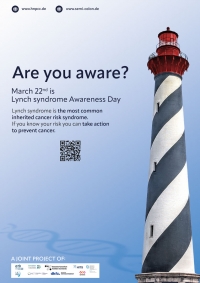
© 2023 ATB.
Lynch syndrome is the most common inherited cancer syndrome, however only 5% of carriers are aware of their diagnosis. The large underdiagnosis of Lynch syndrome is related also to the low level of Lynch syndrome awareness among healthcare professionals and the general population. How can we change this? We want to draw attention to Lynch syndrome, and today, March 22nd, is the best time to do so. We are happy to complete our Lynch syndrome Campaign 2023 with the final poster symbolizing hope for new preventive horizons opening for Lynch syndrome.
This awareness campaign is a joint project of the Department of Applied Tumor Biology in collaboration with Semi-Colon and the German Consortium for Familial Colorectal Cancer, and supported by the Network Against Colorectal Cancer, ERN Genturis and HITS. We want to inform about the most important aspects of Lynch syndrome and to raise awareness about a possible hereditary background of cancer at a young age.
For more information please refer to Lynch syndrome Guide newly published by the German Lynch syndrome Patient Organisation Semi-Colon.
Third Poster in the Awareness Campaign on Lynch syndrome: spotlight on bowel cancer
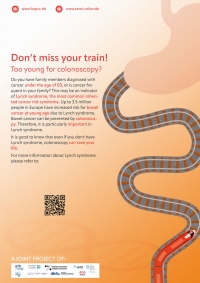
© 2023 ATB.
As part of our Lynch Syndrome Awareness Campaign during Colorectal Cancer Awareness Month in March, we would like to put the spotlight on colorectal cancer. Colorectal cancer is one of the most common tumor manifestations in Lynch syndrome. Therefore, colorectal cancer screening in the form of a colonoscopy has a particularly high relevance for people and families with Lynch syndrome.
This awareness campaign is a joint project of the Department of Applied Tumor Biology in collaboration with Semi-Colon and the German Consortium for Familial Colorectal Cancer, and supported by the Network Against Colorectal Cancer, ERN Genturis and HITS. We want to inform about the most important aspects of Lynch syndrome and to raise awareness about a possible hereditary background of cancer at a young age.
For more information please refer to Lynch syndrome Guide newly published by the German Lynch syndrome Patient Organisation Semi-Colon.
Second Poster in the Awareness Campaign on Lynch syndrome highlights gynecological aspects
© 2023 ATB.
Continuing our Lynch syndrome awareness campaign, on the International Women’s Day (08.03.23) we would like to draw attention to the gynecological aspects of Lynch syndrome. In addition to the increased risk of colorectal cancer, women with Lynch syndrome have an increased risk of gynecological tumors, especially uterine cancer. When such a tumor occurs, especially in women at a young age, possible Lynch syndrome should be considered. The diagnosis is of great relevance for the medical care of the affected persons and their families.
This awareness campaign is a joint project of the Department of Applied Tumor Biology in collaboration with Semi-Colon and the German Consortium for Familial Colorectal Cancer, and supported by the Network Against Colorectal Cancer, ERN Genturis and HITS. We want to inform about the most important aspects of Lynch syndrome and to raise awareness about a possible hereditary background of cancer at a young age.
For more information please refer to Lynch syndrome Guide newly published by the German Lynch syndrome Patient Organisation Semi-Colon.
Awareness Campaign on Lynch syndrome kicks off Colorectal Cancer Awareness Month March
© 2023 ATB.
More and more people develop colorectal cancer at a young age. Every fifth colorectal cancer under 50 has a hereditary cause. The most common inherited tumor risk syndrome is Lynch syndrome. Affected individuals carry a genetic alteration in their DNA that increases their cancer risk. Only very few carriers know about their increased cancer risk. To draw attention to the topic of Lynch syndrome, we are launching a series of posters in March, the colorectal cancer awareness month. This is a joint project of the Department of Applied Tumor Biology in collaboration with Semi-Colon and the German Consortium for Familial Colorectal Cancer, and supported by the Network Against Colorectal Cancer, ERN Genturis and HITS. We want to inform about the most important aspects of Lynch syndrome and to raise awareness about a possible hereditary background of cancer at a young age.
For more information please refer to Lynch syndrome Guide newly published by the German Lynch syndrome Patient Organisation Semi-Colon
INDICATE Initiative: Two papers on the topic of HLA type, cancer risk and cancer immunoediting are published this month in the International Journal of Cancer and HLA
© 2022 The Authors. International Journal of Cancer published by John Wiley & Sons Ltd on behalf of Union for International Cancer Control
The associations of certain HLA types with disease susceptibility have been previously shown for virus infections, however in cancer this aspect remains poorly understood. Lynch syndrome with its genetically defined population and strong involvement of the immune system in the carcinogenic process is an ideal model to address this question for the first time in a systematic manner.
Our previous research pointed at a possible influence of the HLA type on the potential of the immune system to eliminate cancer cells. Together with our colleagues from DMQ (HITS) and our INDICATE partners from Germany, the United Kingdom, Finland, the Netherlands, Norway, and Hungary we now have published an open access article in the International Journal of Cancer, describing the fascinating interplay between the HLA system and human disease susceptibility, announcing the launch of INDICATE and inviting researchers worldwide to collaborate in this project.
Moreover, we developed a refined approach for characterizing presence or absence of HLA-A*02, the most common HLA-A allele in the Caucasian population, in archival samples, which is now published in HLA. By sharing this methods with our peers, we want to promote studying HLA type-dependency during the pathogenesis of a wide range of diseases and make archival and historic tissue samples accessible for identifying HLA-A*02 alleles.
March 22nd is the Global Lynch syndrome Awareness Day
It’s Lynch Syndrome Day!
March 22nd is the Global Lynch syndrome Awareness Day. People with Lynch syndrome have a genetic predisposition to develop various types of cancer, particularly colon and uterine cancer, at a young age. There is an estimated number of around 300,000 Lynch syndrome carriers in Germany, however only about 5% of those have been diagnosed so far and therefore have the opportunity to participate at preventive and early detection measures in a timely manner.
The genetic changes underlying Lynch syndrome cannot be cured, but many types of cancer that can occur in the context of Lynch syndrome can, if detected early enough. The diagnosis of Lynch Syndrome also enables testing of family members for this hereditary predisposition and adaptation of preventive measures to the increased cancer risk at a young age.
Several clinical and molecular indications are important for the suspicion of Lynch syndrome:
- early age at diagnosis, for example colon cancer or uterine cancer before the age of 50,
- family history of gastrointestinal or gynecological cancer,
- typical changes in the tumor tissue (evidence of microsatellite instability or evidence of failure of the mismatch repair genes)
Lynch Syndrome is still mainly unknown to the public today. And unlike many other European countries, not all colorectal cancer tumors are tested for the typical molecular changes in Germany today, and thus, the opportunity to discover the hereditary risk is being missed.
Lynch Syndrome Awareness Day was created to raise awareness of this hereditary cancer risk, so that more affected people can be diagnosed at an early stage and so that more of those affected can take part at specialized cancer surveillance programs.
Save the date: Lynch syndrome Patient Information Day on March, 12th
Lynch syndrome Patient Information Day
Lynch patients are confronted with questions from different subject areas: What prevention and early detection do I need? How do I deal with the knowledge of lifelong cancer risks? What new findings are there in terms of diagnostics and therapy? Where can I find the right information and advice? Patient advocacy and support group Semi-Colon will discuss these and other questions together with Lynch syndrome families and exchange experiences in dealing with the hereditary cancer risk.
To this event several experts have been invited who will provide an overview of the main topic, inform about new findings and developments in Lynch syndrome / HNPCC and, of course, will also be available to answer the questions.
For more information please follow https://www.semi-colon.de/news/ as well as Semi-Colon Facebook page.
Normal mucosa immune milieu in Lynch syndrome carriers and tumor patients: our new publication in Gastroenterology
© Kloor / DKFZ
Colorectal immune microenvironment as a risk factor for colorectal cancer in Lynch syndrome
Lynch syndrome is the most common inherited colorectal cancer syndrome. However, only approximately half of variant carriers develop cancer during their life. Factors determining cancer risk in Lynch syndrome individuals are largely unknown. In our recent study published this month in Gastroenterology we analyzed normal colorectal mucosa of Lynch syndrome tumor patients and Lynch syndrome carriers without tumor manifestation as well as Lynch syndrome colorectal cancer tissue for immune cell composition. For that we used quantitative immune cell analysis by immunohistochemistry and expression profiling of more than 700 immune-relevant genes. Our results revealed drastic differences in the qualitative and quantitative immune cell composition of tumor tissue compared to normal mucosa samples. Importantly, among the normal mucosa samples, those from tumor-free Lynch syndrome carriers were clearly distinguished from normal mucosa samples of tumor patients. In addition, analysis of rectal mucosa samples from CAPP2 trial participants with long follow-up revealed that the density of T cells in the normal mucosa correlated with time to tumor manifestation in Lynch syndrome. Our study reflects an important role of the immune profile of normal colorectal mucosa in Lynch syndrome-associated tumorigenesis.
The study was mainly funded by the Else-Kröner-Fresenius-Foundation and conducted in cooperation with the Department of General Pathology, UKHD (Albrecht Stenzinger, Jan Budczies, Martina Kirchner and Klaus Kluck), University Hospital Bonn (Robert Hüneburg and Jacob Nattermann), NCT Heidelberg (Georg Martin Haag and Elena Busch), University of Newcastle, UK (John Burn and Richard Gallon), University of Jyväskylä, Finland (Jukka-Pekka Mecklin and Toni Seppälä) and other national and international collaborators.
New Research Project in Mathematical Oncology

Synergizing tumor biology and mathematics to decode tumor development in hereditary colon cancer using mathematical modelling of medical data
ATB and EMCL have joined forces in a new research project funded by the Klaus Tschira Foundation. The aim of the collaborative project is to understand tumor initiation, evolution, and immunology by means of mathematical modeling and thereby find approaches to potentially prevent hereditary cancer in the future. The Heidelberg project entitled “Mathematics in Oncology” is a pilot initiative to strengthen interdisciplinary translational research. Through the three-year funding, the Klaus Tschira Foundation is supporting an interdisciplinary project that enables new synergies between mathematics and medicine and strengthens the innovative research profile of Heidelberg as a center of science.
ATB Alumnus Dr. Alexej Ballhausen receives AIO Young Scientist Award 2021
Dr. Alexej Ballhausen receives the AIO Young Scientist Award 2021 for his research on the role of immune selection in the evolution of MSI cancer published in Nature Communications.
AIO Young Scientist Award 2021
This year, the AIO (Arbeitsgemeinschaft Internistische Onkologie) in the German Cancer Society (Deutsche Krebsgesellschaft e. V.) is for the first time awarding the Young Scientist Award for innovative work in the field of medical oncology, including all topics related to pathogenesis, pathophysiology, diagnostic and prognostic factors as well as therapy and aftercare of malignant, solid tumors. This award serves to promote the next generation of scientists and oncologists.
The AIO Young Scientist Award goes to the author(s) with the best publication on the above-mentioned focuses. We are proud to announce that the AIO Young Scientist Award 2021 was received by our ATB Alumnus Alexej Ballhausen currently working at Charité , Berlin (Charité – Universitätsmedizin Berlin, Department of Hematology, Oncology and Tumor Immunology). Alexej received the Award for the great contribution to unraveling the role of immune selection in the evolution of microsatellite-unstable cancers, which was published in Nature Communications 2020 (see also press-release of DKFZ, Heidelberg University Hospital and HITS, as well as Behind the paper Blog post by Matthias Kloor).
We thank the AIO for distinguishing Alexej’s scientific work, congratulate Alexej to this highly honorable Award and wish him lots of success in his future career!
PhD Student Position in Mathematics (f/m/d) at EMCL

At the Engineering Mathematics and Computing Lab (EMCL) the following position is to be filled with 39.5h/week from December 1st, 2021 or as soon as possible thereafter:
PhD Student Position in Mathematics (f/m/d)
Project: Mathematical Oncology
Cancer is one of the leading causes of disease-related death worldwide. In recent years, rapid increase in the molecular understanding of cancer has unraveled significant additional complexity of the disease. Although large amounts of data on cancer genetics and molecular characteristics are available and accumulating with increasing speed, adequate interpretation of these data still represents a major bottleneck. This is exactly where mathematics can be applied to oncology: Through mathematical modeling of complex biological processes we are able to gain novel medical insights.
The project aim is three-fold: Firstly, mathematically modeling the evolution of hereditary tumors to improve the existing prevention strategies, secondly, elevating tumor immunology to a genome-wide level using adequate data analysis and modeling techniques, and thirdly, predicting the efficacy of clinical approaches for diagnostics, prevention and treatment based on the developed models.
The project will be supervised by Prof. Dr. Vincent Heuveline (EMCL) and PD Dr. Matthias Kloor (ATB). It is fully funded by Klaus Tschira Foundation Project “Mathematics in Oncology”. Remuneration is based on TV-L E 13. The position is fully funded for 3 years.
Immune prevention of inherited colorectal cancer

© Kloor / DKFZ
Recurrent frameshift neoantigen vaccine elicits protective immunity with reduced tumor burden and improved overall survival in a Lynch syndrome mouse model
Lynch syndrome is the most common inherited colorectal cancer syndrome predisposing affected individuals to developing cancer at young age. Due to the distinctive character of tumor pathogenesis in Lynch syndrome and well-defined target population, Lynch syndrome represents both clinically and molecularly an ideal scenario for testing the feasibility of immune-preventive approaches against cancer. Our group has been studying the mutational and immune profile of Lynch syndrome-associated tumors for more than 20 years. This research led to identification of candidate neoantigens for a potential preventive vaccination in Lynch syndrome. The identified candidates have been tested for safety and immunogenicity in a Phase I-IIa clinical trial. The tumor-preventive effect of this vaccination strategy in humans needs to be demonstrated in future clinical trials. However, already now the success of this approach could be demonstrated in a Lynch syndrome mouse model. The results of this study were recently published in Gastroenterology.
The study on a Lynch syndrome mouse model for the first time demonstrates that tumor prevention by vaccination with mutation-induced neoantigens is feasible and effective. The immune prevention strategy by vaccination with selected neoantigens therefore holds great promise for individuals with Lynch syndrome. The study is the result of a long-lasting successful collaboration between the DKFZ (Heidelberg, Germany), Heidelberg University Hospital, Weill Cornell Medical College (New York, USA) and the National Cancer Institute (Bethesda, USA). The project was funded mainly by the NCI in frame of the Cancer Moonshot Program and the German Research Foundation (Deutsche Forschungsgemeinschaft).
Scientists from Heidelberg tackle early colorectal cancer formation using mathematical models

Mathematical modeling of molecular pathways in colorectal carcinogenesis and colonic crypt evolution in Lynch syndrome
Two studies have been published recently in frame of the “Mathematics in Oncology” collaborative initiative between ATB and the Engineering Mathematics and Computing Lab (EMCL), Heidelberg University (https://emcl.iwr.uni-heidelberg.de/). The first study published in PLOS Computational Biology delivers the results of a new mathematical model of colorectal carcinogenesis that consists of multiple components accounting for dependent and independent mutational events. The obtained simulation results are in concordance with current clinical tumor data, giving hints to the initial steps of cancer formation in Lynch syndrome. The approach provides a modular framework for modeling multiple pathways of carcinogenesis that could be applied to other organs by slight modifications.
In the second study published in Computational and Systems Oncology the scientists used computer simulations to analyze the biological processes behind the invisible initial steps of colon cancer development on a crypt level. Current research suggests that specific mutated crypts are the origin of colon cancer. Analyzing the mutational processes within a crypt is key for understanding cancer development and may have significant implications for cancer prevention. The scientists have now developed a computational model to simulate these mutational processes within a crypt on a computer. These computer simulations allow analyzing if and how fast different so-called driver mutations take over a crypt. The results of the study provide a valuable basis for future studies directed to support tailored management of Lynch syndrome carriers.
Anita- and Friedrich-Reutner-Prize 2020
Dr. Aysel Ahadova from the Department of Applied Tumor Biology, Institute of Pathology at Heidelberg University Hospital receives the Anita- and Friedrich-Reutner-Prize 2020 for her research on tumor prevention in Lynch Syndrome, the most common inherited colorectal cancer syndrome.
https://www.klinikum.uni-heidelberg.de/newsroom/individuelle-vorsorge-und-therapie-bei-darm–eierstock–und-brustkrebs/
Scientists Dr. Aysel Ahadova and Dr. Dr. Sabine Heublein awarded Anita- and Friedrich-Reutner-Prize 2020
This year’s Anita-and-Friedrich-Reutner-Prize was awarded to two scientists for their excellent contribution to individualized prevention and treatment of colorectal, breast and ovarian tumors.
Dr. Aysel Ahadova from ATB investigates carcinogenic pathways of the most common inherited colorectal cancer syndrome, Lynch syndrome, and their importance for the tailored design of cancer preventive measures.
With the yearly awarded prize of 10.000 Euro Professor Dr. Friedrich Reutner – Honorary Senator of the University Heidelberg – and his wife, Anita Reutner support female scientists of the Medical Faculty, with a particular focus on clinically relevant research questions.
LYNKED IN 2020 Conference at Dana Farber Cancer Institute: Keynote Speaker Matthias Kloor

2020 Lynch Syndrome Virtual Patient Conference
The 5th Annual LYNKED IN conference for individuals and families of those with Lynch syndrome was held on Saturday, September 12, 2020.
- Over 750 attendees registered for the event from 39 states and 14 countries.
- The conference brought together over 230 attendees in a live virtual series of talks and Q&A sessions.
- Advocacy groups joined LYNKED IN this year in post-conference break-out rooms.
Matthias Kloor gave this years’ Keynote Lecture at the virtual LYNKED IN Conference and talked about the latest advances in vaccine development for Lynch syndrome-associated tumors. For watching this and other video presentations from LYNKED IN 2020 please click here.
Immune surveillance and immunoediting in microsatellite-unstable cancers: our new publication in Nature Communications
© DKFZ
Cancer evolution recapitulates basic principles of biology in a nutshell, as surviving cell clones over time acquire mutations that allows them to thrive in an often hostile and changing environment. Adaptation processes leave their traces in the genome of manifest cancers, so studying cancer genomes can open a window into the past. In this sense, analyzing mutation signals in tumor genomes to unravel early steps of tumor formation shares similarities to cosmology research measuring cosmic microwave background noise to shed light on the origin and history of the universe.
The present study was a collaboration between the Heidelberg University Hospital, the DKFZ Heidelberg, Heidelberg University, the Heidelberg Institute for Theoretical Studies (HITS) and international collaboration partners. We developed ReFrame, a new algorithm to quantitatively detect microsatellite indel mutations with high sensitivity. Using ReFrame, we identified mutations shared by most MSI colorectal and endometrial cancers.
We further discovered a negative correlation between the prevalence of a defined indel mutation in MMR-deficient colorectal or endometrial cancers and the predicted immunogenicity of the resulting frameshift peptide. Our study strongly supports the concept of continuous immunoediting in human cancers and provides new evidence for the hypothesis that immunogenic cancers and pre-cancer cell clones can be attacked and potentially eradicated by the host’s immune system.
This strongly encourages the concept of neoantigen-based cancer-preventive vaccines that may in the future help to reduce tumor risk in Lynch syndrome and potentially beyond. We have recently demonstrated the safety and immunological efficacy of a prototype frameshift peptide vaccine in a phase I/IIa clinical trial.
New publication in the “Mathematics in Oncology” collaboration

© 2020 The Authors. International Journal of Cancer published by John Wiley & Sons Ltd on behalf of Union for International Cancer Control
In frame of the “Mathematics in Oncology” collaborative initiative between ATB and the Engeneering Mathematics and Computing Lab (EMCL), Heidelberg University (https://emcl.iwr.uni-heidelberg.de/), we aim to gain novel insights into cancer evolution through mathematical modeling of the underlying complex biological processes.
We focus on microsatellite-unstable (MSI) cancers, which show a high number of mutations due to a deficiency of the DNA mismatch repair system responsible for repairing mistakes occuring during DNA replication.
MSI cancers develop in elderly patients sporadically and in younger patients in the context of Lynch syndrome, the most common inherited colorectal cancer syndrome. Lynch syndrome is associated with an increased life time risk of developing cancer in the large bowel (colorectal cancer), the endometrium and other organs.
Lynch syndrome is estimated to affect 1 out of 280 individuals, yet often remains undiagnosed. Thus, a diagnostic procedure with high sensitivity and specificity is of central clinical significance. As BRAF V600E mutations have been reported to be associated with sporadic MSI cancers, current international diagnostic guidelines recommend using BRAF mutations in order to distinguish between sporadic and likely hereditary MSI colorectal cancer. Due to a significant difference in age at diagnosis between sporadic and hereditary MSI CRC patients, we hypothesized that the performance of BRAF testing for identifying sporadic MSI CRC could be age-dependent.
In our recent study, we systematically analyzed data from published studies, public databases and population-base patient cohorts. In addition, we performed sensitivity analysis as well as cost calculations of BRAF testing.
We identified that though being highly effective in older patients, BRAF testing led to a high risk of missing Lynch syndrome patients and increased costs at age <50 years, thereby showing its poor performance in this age group. We therefore suggest to directly refer MSI CRC patients <50 years to genetic counseling without BRAF testing.
The study was developed through the active Mathematics in Oncology collaboration (Link: https://emcl.iwr.uni-heidelberg.de/research/projects/mathematical-oncology) with the Engeneering Mathematics and Computing Lab (EMCL, Head: Vincent Heuveline), Heidelberg University Hospital, together with the Department of General Pathology, Institute of Pathology, University Hospital Leipzig and various institutions of other German universities. Hendrik Bläker from the University Hospital Leipzig, Michael Hoffmeister from the Division of Clinical Epidemiology and Aging Research, DKFZ (German Cancer Research Center), Aysel Ahadova and Matthias Kloor, both from ATB (Head: Magnus von Knebel Doeberitz), designed the study, collected and analyzed data from different sources. From EMCL, Saskia Haupt and Vincent Heuveline were strongly involved in the analysis and interpretation of the data. The study titled “Age-dependent performance of BRAF mutation testing in Lynch syndrome diagnostics” (doi: 10.1002/ijc.33273) was recently published in the International Journal of Cancer.
Molecular diversity of Lynch syndrome colorectal cancer reflected in clinical disease manifestation: an international study published in Gastroenterology
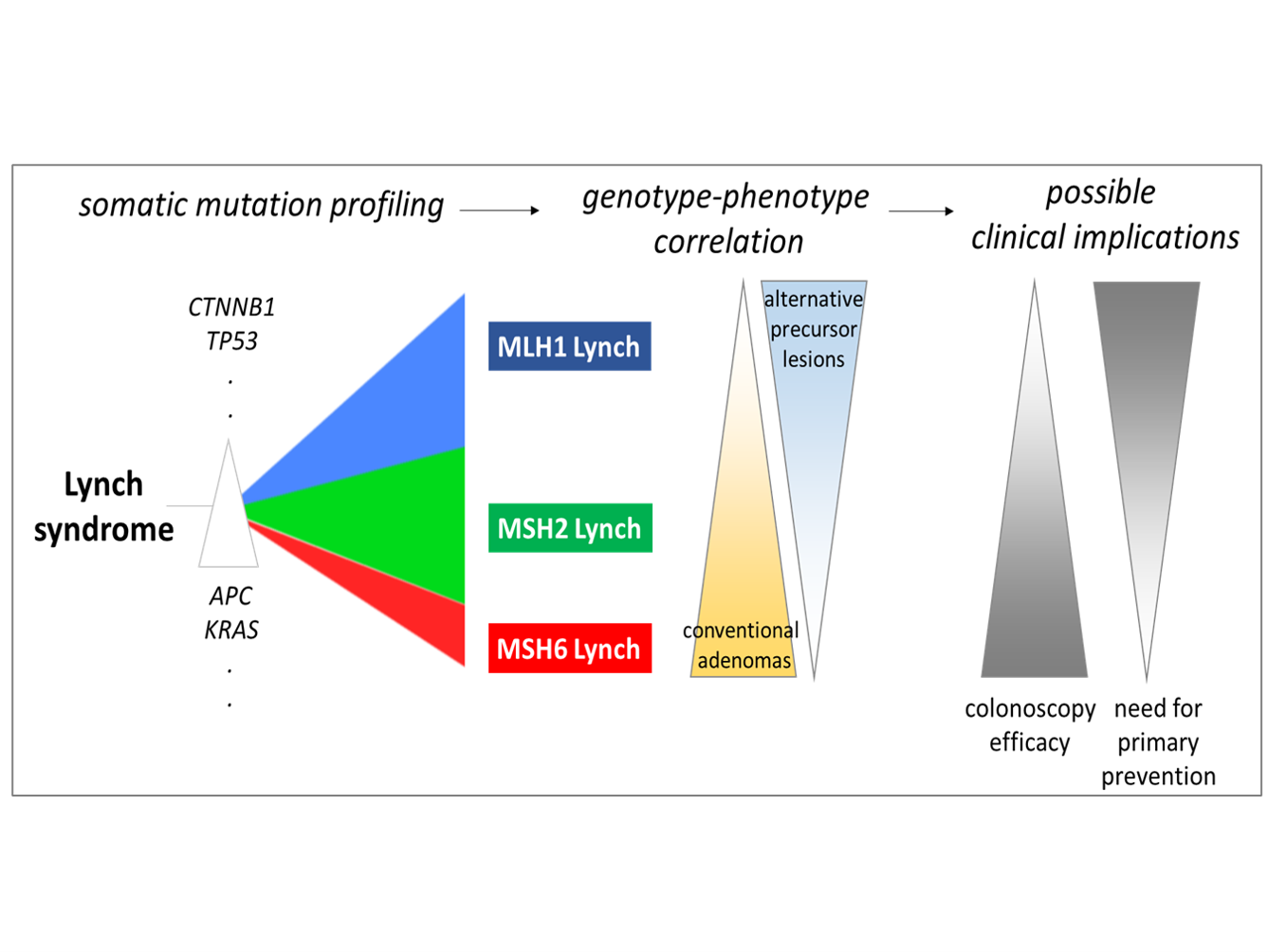
© Matthias Kloor
Associations of Pathogenic Variants in MLH1, MSH2, and MSH6 With Risk of Colorectal Adenomas and Tumors and With Somatic Mutations in Patients With Lynch Syndrome. (doi: 10.1053/j.gastro.2019.12.032)
Lynch syndrome is the most common inherited colorectal cancer syndrome. The affected individuals carry a germline variant in one of the mismatch repair genes (MLH1, MSH2, MSH6 and PMS2), enhancing their lifetime risk of developing a broad spectrum of tumors, most commonly colorectal and endometrial cancer. In order to prevent colorectal cancer, colonoscopy with polypectomy is recommended for Lynch syndrome carriers. However, the reasons for colorectal cancer development under regular colonoscopy surveillance in some Lynch syndrome carriers are unknown.
Our data demonstrate that the observed diversity is associated with the MMR gene affected in the germline, and suggest tailoring the preventive approaches for Lynch syndrome carriers according to pathogenic pathways dominating the carcinogenic process depending on the MMR gene.
The study was performed with grant support of Wilhelm Sander Foundation and German Cancer Aid.
